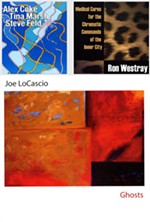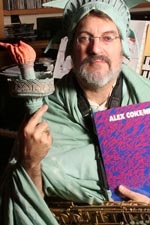Checking In: Alex Coke Plays Saxophone In His Driveway
ATX tenor titan stops, looks, and listens – then blows!
By Raoul Hernandez, 3:47PM, Wed. Jul. 8, 2020
“Tough Texas Tenor” described Dallas native and Austinite since 1977 Alex Coke in a millennial Chronicle feature, the saxophonist responding: “I was born in Texas and I play the tenor, so I guess that qualifies, but it takes a long time to get a sound.” And what a thoughtful, humanist tone that remains – Mondays in his driveway for the hood, and here online.
Austin Chronicle: Where are you sheltering and under what circumstances? Who else is there and how’s that going?
Alex Coke: I’m sheltering at home in Austin with Elaine Barber. Fortunately, we have enough space where we can both teach, practice, and not drive each other crazy. It’s nice to have time for walks and not always be in such a rush, but it’s a huge concern how we can crawl out of this mess into a better society.
In mid-April, we were playing music at home waiting for groceries to be delivered. We decided to move out to the driveway so as not to miss the delivery and also play for the delivery person as a kind of tip. While we were playing, neighbors stopped to listen and asked if we would do it again.
We’ve made it a regular Monday evening occasion and are touched by how much it means to everyone, including us.
AC: At what point did C-19 shut down operations for you, and what went down with the ship, so to speak, both personally & professionally?
AC: I arrived in Amsterdam March 10 with several concerts/workshops in the Netherlands and a week playing in Johannesburg, South Africa. My first gig was the 13th and I believe on the 11th President Trump announced there would be no travel into the United States after the 12th. I changed my ticket, he backtracked saying American citizens could come back, so I changed it again to stay at least for the first gig. The embassy couldn’t tell me anything precisely.
I became very aware of the complete mismanagement, lack of leadership, and chaos that the United States was – and still is – experiencing.
I’m hoping to go back to Europe in January/February 2021 for rescheduled concerts. Hopefully, the pandemic will be under control and the E.U. will let U.S. citizens in.
AC: As a global culture, people employ music for every purpose imaginable, obviously spanning religion to entertainment and everything in between. What happens to communities like ours when people can no longer access it in person?
AC: This is a great question for the history books. I think there will be many changes and ramifications that we can’t even begin to imagine.
Just as radio, records, cassettes, CDs, VCRs, Tivo, and the internet changed the face of delivering music and packaging it, that was not the end of live music. I’m certain we will see more variations and imaginative ways to do streaming and social distancing. This will probably push forward the research into 3-D streaming in virtual reality experiences, though not replace actual live music for most fans.
There are many porch concerts and pop-up jam sessions at the moment. I hope there’s a renaissance for people playing music at home and learning instruments.
I believe there are certain freedoms, beauties, and truths about music in the wild not captured to some sort of medium. There’s a magic of merging musicians, audience, and music all together in a particular, specific, finite moment of time and space together that can’t happen any other way.
AC: Everyone’s had to shift or drastically alter their work situation. What does that look like for you?
AC: I’m fortunate First Presbyterian Church where I have played for over a dozen years has continued to keep my paycheck coming in. I’m teaching online. Sometimes, I’ll record a track and email it, but I’m not really set up as a recording studio.
We always joke that being a musician also involves being a promoter, a travel agent, driver, web designer, mover, accountant/bookkeeper. Now we can add recording engineer, videographer, and a host of other online streaming talents to that list. The biggest alteration for me happened before the virus: the loss of my worthy constituent and musical brother Rich Harney.
Not playing, studying, and learning with him won’t renew when this crisis is over.
AC: What’s your soundtrack for the apocalypse and what role does music play for you as a fan and scholar of it in times of hardship?
AC: I hope it’s more like a sabbatical than the apocalypse.
I am lucky to be hunkered down with another musician. I’m exposed to more classical, medieval, and baroque music. Gnawa music and Ethiopian lyre music has resurfaced on my sound system.
I’m learning how to listen from a new direction. I listen to a lot of jazz and improvised music. I like compilations, and have had time to sit and listen in a way I haven’t in a while.
I’ve had time to read. Sophisticated Giant, Maxine Gordon’s book about her husband, Dexter Gordon, isn’t only a great book about the man, but the history of the time as well. Reading it has led me back to my library of both CDs and vinyl. I’ve listened several times to Steeplechase [Records’] The Complete Trio & Quartet Studio Recordings. 1974, 1975, 1976: This was the time when Dexter became a Swedish resident and the music ties in beautifully with stories in the book from that time of his life.
I’ve been listening to a lot of Fred Hersch, particularly his set Trio: 10 Years/6 Discs on Palmetto and The Classic Quartet/The Complete Impulse! Studio Recordings of John Coltrane. Both these are fascinating looks into the way an ensemble grows and creates together.
Another great example is the box set of Complete 1962 Live Recordings of The Cannonball Adderley Sextet. There’s fantastic playing by everyone including a young Joe Zawinul, but for me, one of the real revelations was hearing Youssef Lateef. So, it was back to my library and his website where I discovered an interesting book of conversations between him and Albert “Tootie” Heath. I also found lots of music he had written, including a piece for soprano saxophone and harp that I hope to play soon.
No gigs means lots of time at home and the discovery of many documentaries and concerts on Youtube, PBS, and the web. Brother Yusef, Mal Waldron, Mae West, Steve Lacy, and Louis Moholo are just a few. One upside are the plethora of events one can attend without the travel.
Last week, I was able to “attend” a historical harp convention seminar on figured bass and the Jazz Journalists Association, both in the same day. Jazz clubs like the Bimhuis in Amsterdam, Smalls and the Village Vanguard in NYC are streaming concerts as well as local jazz venues such as Monks and Parker.
A note to readers: Bold and uncensored, The Austin Chronicle has been Austin’s independent news source for over 40 years, expressing the community’s political and environmental concerns and supporting its active cultural scene. Now more than ever, we need your support to continue supplying Austin with independent, free press. If real news is important to you, please consider making a donation of $5, $10 or whatever you can afford, to help keep our journalism on stands.
Jay Trachtenberg, Sept. 19, 2008
June 6, 2025
May 30, 2025
Alex Coke, Elaine Barber, Rich Harney, First Presbyterian Church, Dexter Gordon, Maxine Gordon, John Coltrane, Fred Hersch, Cannonball Adderley, Joe Zawinul, Youssef Lateef, Albert “Tootie” Heath, Mal Waldron, Mae West, Steve Lacy, Louis Moholo, Bimhuis, Village Vanguard, Monks Jazz Club, Parker Jazz Club










